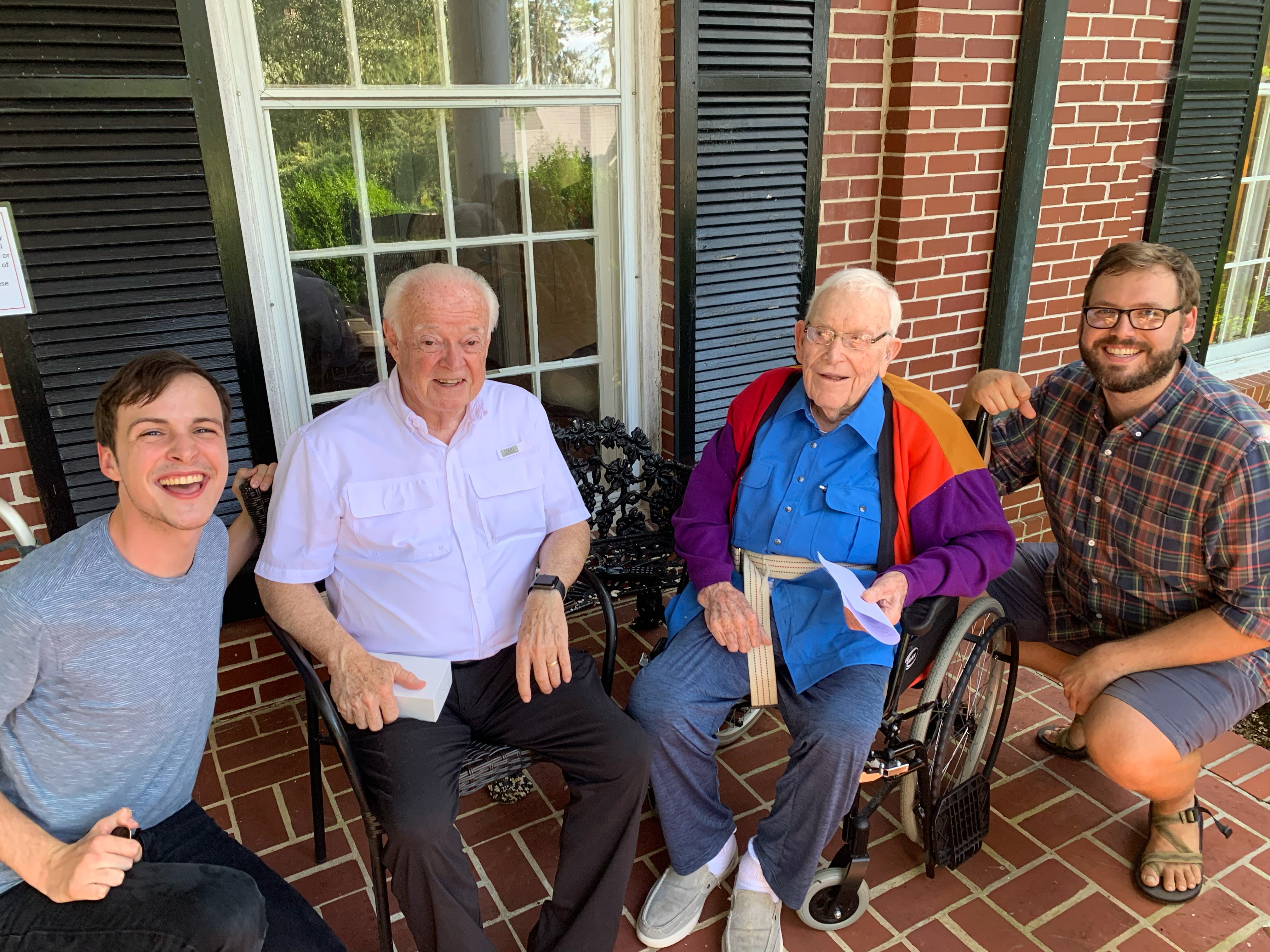Mr. Bill Davies and Mr. Harold Storey have forged a decades-long friendship over a shared love of their neighbors. From their work with First Baptist to work with men in recovery, they are pillars of what it means to be a good neighbor in Rome.
Can you introduce yourselves?
Mr. Bill Davies: I’m Bill Davies, I’m married to Merrill Davies. I’ve been retired fifteen years after 32 years as Minister of Education Administration at First Baptist Church. Susan Seagraves, founder of The Davies Shelters, accuses me of being the Co-Founder of The Davies Shelters. I’m a glad citizen of this community and a co-conspirator with Harold Storey here.
Mr. Harold Storey: I’m Harold Storey. I grew up in Crystal Springs, North Floyd County — but we lived in Chatooga County. My parents started Storey Lumber Company. The best memories I’ve got were being in a family who knew what they were about. [Mr. Storey is also a World War II Veteran, awarded the Purple Heart.]
You both are pillars of “a legacy of neighborliness” in our community. How have you been able to be a “good neighbor” in Rome, GA?
Harold: The idea [of a shelter] came after we’d spent…I don’t know how many years with Star House [Star House sheltered up to 25 men with alcohol dependency who had just come out of Floyd County Jail detox and needed a place to go.] We would meet on Sunday evenings to eat a meal with the guys. We went, just went there and visited with them, did whatever the guys wanted to do.
Some other people wanted to find out what we were doing and why. They didn’t want to come see it, you know, and it took a visit for anybody to find that [STAR House] had an understanding atmosphere that I’ve never seen anywhere else, except at church, maybe. For us, we may have been stupid, but for us, we just saw a very friendly group of guys and we’d just as soon have them talk [to us] as we talk [to them.]
Bill: Everything we got out of the STAR House sort of became, something which influenced the work at the shelter because you learn lessons that are universal. When Susan Seagraves said she was going to start a homeless shelter, I told her she was crazy. But we went ahead and started it anyway. I was teaching with Herald on Sunday nights and we decided we’d do it at the shelter too.
What do you think it is that compelled you to do this kind of work in our community? To believe this is the important thing to do?
Bill: That’s the way we were raised and that’s part of what our families do growing up when I was a kid. My dad was an immigrant. He came to America when he was seven. After working in the coal mines and getting married, he opened up a little grocery store and Mama taught school, we didn’t make a lot. But when there was somebody sick in the family, our house was where they came. That was just what we did.
Harold: I remember folks coming to my family’s the back door. My parents were so committed to other people and being supportive. People were walking north and would come by the house and your mother always fed them. I didn’t know a soul didn’t have a dime, just went to the door and asked for food, and would sleep on the side porch.
How have you seen the community of Rome, GA partner in taking care of our neighbors?
Bill: One of the best things [the community did to support this work] was they would employ the guys that were going through the program. You’d be out at a restaurant somewhere, or working with a carpenter or a plumber, and find out that one of the guys working with them was, the STAR House guys!
Harold: There are people in our community that want to help in their own way. But their tendency is “I can’t do anything, I haven’t had an experience of where others have been.” But with the right [partnerships] and a whole lot of prayer, you can be [a good neighbor].
Bill: When I first started working at First Baptist I heard about the people’s interests — they’re interested in homelessness, health care, family counseling, juvenile issues and things like that. It seemed to me if you’re going to be teaching adults about Bible study, it needs to be pragmatic. They want to know “what am I going to do this weekend?” “I see these people walking by the church here some of them say, ‘can I get help in there? Can I not get help in there?'”
The wonderful thing about this is we have a generation coming up. [Harold and I] are beginning to show a little age, but you know, it’s young people who give us hope that this can go and be better and stronger because of what we have learned and what the next generation is gonna learn along the way.

